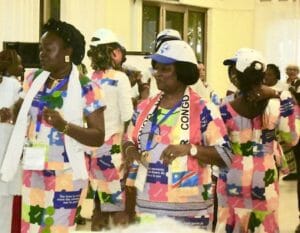Inauguration 2017 Special Coverage w/ Angela Davis, Naomi Klein, Ralph Nader & More
Menu

Special coverage in the Trump Era
From Public Citizen's Corporate Presidency site: "44 Trump administration officials have close ties to the Koch brothers and their network of political groups, particularly Vice President Mike Pence, White House Legislative Affairs Director Marc Short, EPA Administrator Scott Pruitt and White House budget director Mick Mulvaney."
Dark Money author Jane Mayer on The Dangers of President Pence, New Yorker, Oct. 23 issue on-line
Can Time Inc. Survive the Kochs? November 28, 2017 By Jane Mayer
..."This year, among the Kochs’ aims is to spend a projected four hundred million dollars in contributions from themselves and a small group of allied conservative donors they have assembled, to insure Republican victories in the 2018 midterm elections. Ordinarily, political reporters for Time magazine would chronicle this blatant attempt by the Kochs and their allies to buy political influence in the coming election cycle. Will they feel as free to do so now?"...
"Democracy in Chains: The Deep History of the Radical Right’s Stealth Plan for America" see: our site, and George Monbiot's essay on this key book by historian Nancy MacLean.
Full interview with The New Yorker’s Jane Mayer March 29, 2017, Democracy Now! about her article, "The Reclusive Hedge-Fund Tycoon Behind the Trump Presidency: How Robert Mercer Exploited America’s Populist Insurgency."
Democracy Now! Special Broadcast from the Women's March on Washington
The Economics of Happiness -- shorter version
Local Futures offers a free 19-minute abridged version of its award-winning documentary film The Economics of Happiness. It "brings us voices of hope of in a time of crisis." www.localfutures.org.
What's New?
September 27, 2018
African Feminists Emphasize Key to Global Peace
September 25, 2018
“The days when one could claim that the situation of women had nothing to do with matters of national and international security are, frankly, over.” —Valerie M. Hudson
On the eve of World War II, the iconic writer Virginia Woolf responded to a male attorney’s question about how to prevent war. The key, she replied, is that women must be educated and able to earn a living. Only then, once they were not dependent on fathers and brothers, could women possess “disinterested influence” to exert against war. The man’s question, she continued, is “how to prevent war.” Ours is, as she put it in “Three Guineas,” “Why fight?”
Peace and the security of nations are powerfully linked with the equality of women, though it is the rare male power broker—whether a diplomat or military liaison—who acknowledges this. I traveled to Ghana recently to participate in the International Feminist Peace Congress, organized by the Women’s International League for Peace and Freedom (WILPF). My interviews—with Western women prior to the congress and with African women and a few men during their sessions on feminist peace in Africa—reinforced the mounting conviction that the fate of nations is tied to the status of women.
WILPF members from the war-ridden Democratic Republic of Congo (DRC) grasp the totality of this conviction. The congress pulsated with vibrant color and bold geometric designs woven into African clothing, wall hangings and tablecloths. Wearing traditional apparel mixing electrifying color and patterns and emblazoned with “Rien sans les femmes,” (“Nothing without women”), DRC members elaborated to me: “We mean everywhere throughout the world. If women are not involved, nothing of critical use to the world will happen.”
While preparing for the conference, two dichotomous realities claimed my thoughts. The first: Feminist revolutions to gain human rights and equality for women have freed and saved the lives of millions of women and girls—without weapons, without fists, without a drop of blood spilled.

Summit representatives from the Democratic Republic of Congo. (H. Patricia Hynes)
The second: Hundreds of millions of women have been injured, harmed and killed by patriarchal institutions and by misogynist men. Why are they targets? Because they are women. How are they attacked? With weapons and rape in war, with fists and rape at home, through the commercial sex trade and through the slow, gendered violence of personal and public inequality.
Peace is quintessentially a woman’s issue, most clearly when the continuum of male violence against women in its private, social and structural dimensions is grasped. “That continuum of violence,” British author Cynthia Cockburn relayed to me by email, “persists along a scale of force (fist to nuclear bomb); space (the home, the street, the village, the city, the battlefield and the nation); and time (pre-war, wartime and post-war).”
“Here’s where gender comes in,” she continued. “There is no escaping the tendency of men and masculinity in most if not all cultures to feature as actors in violence, women as acted upon. And you can’t expect a government that promotes and pays for the shaping of men as war-fighters (often condoning rape as a weapon of war) to foster a civil culture in which male violence against women is noticed, deplored and punished as it should be.”
Recent, groundbreaking analysis validates these convictions." ...

